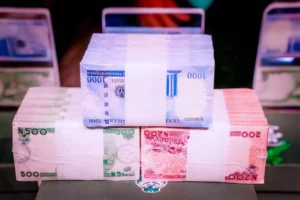Despite the efforts of the Central Bank of Nigeria (CBN) to pump more money into society in order to curtail the naira scarcity, financial experts have urged Nigerians to brace up for more difficult times as the crises might not end any time soon.

Naija News recalls that the Nigeria Labour Congress (NLC) had used the threat of a nationwide strike to force the apex bank into releasing naira notes.
The decision came after weeks of partial implementation of the Supreme Court’s ruling extending the validity of the hitherto phased-out old notes to December.
Data and financial analysts, market intelligence, and expert opinions suggest Nigerians would live with limited cash circulation for as long as months unless there is a radical departure from the apex bank’s management approach.
While revealing that the volume of cash the banks have accessed is a far cry from what the economy required to be fully oiled, a top banker told The Guardian that no bank would be able to meet 50 percent of the cash needs of its customers “without running into serious trouble.”
It was gathered that the naira scarcity is worsened by zero deposits from customers. The two-way normal cash operations model, where tellers take cash from depositors to give to customers, who are withdrawing, has been broken completely, forcing most branches to rely on supply from their regional offices.
In turn, regional or head offices of banks have had to depend solely on CBN in the past two weeks as they have exhausted the residual cash left in their vaults following January/February mop-up.
The process is not sustainable, and I don’t see anything anybody will do to end the supply crisis until that process changes. If customers withdraw cash only to keep a substantial part of it and nobody returns what has been given out to banks as deposits, how much will CBN print to meet the cash needs of the industry?” another banker asked.
While CBN has directed operators to revert to the old cash withdrawal limit, allowing an individual to withdraw as much as N500,000 per day, to achieve speedy circulation, banks have introduced their limits – ranging from N1N10,000 N30,000
Automated teller machines (ATMs) have also been reconfigured to pay less value for transactions.
In some cases, for example, third-party cards are restrained to N2000 per transaction just as most machines do not pay beyond N20,000 per day.
According to Guardian, the barriers were created to minimize the risk of excessive cash withdrawal, which could tip the system toward a crisis.
The CBN Governor, Godwin Emefiele, had urged Nigerians to brace up for a more aggressive cashless situation, suggesting that the country might not return to the pre-naira redesign cash level.
If the governor has changed his position, the data does not suggest so. For instance, currency in circulation (CIC) fell from N3.292 trillion at the end of last year to N982 billion at the close of February. That means the value fell by 70 percent in two months.
In output relations, the CIC to gross domestic product (GPD) ratio is down to 0.49 percent, from 1.63 percent it was in December. The current CIC also translates to N4, 546 per capita (per Nigerian).
The official data is inclusive of the number of new notes being hoarded by Nigerians. With the reintroduction of the old notes, the new N200, N500, and N1000 earlier speculated to have been mopped up by politicians and other very important personalities (VIPs) have disappeared. Currently, no ATMs dispense the notes even as they are not available for withdrawal at over-the-counter.
Some sources said the CBN is also at a loss as to the whereabouts of the mints, with some banks said to have been queried in relation to their non-circulation at the height of the crisis.






















